| Listing 1 - 10 of 16 | << page >> |
Sort by
|
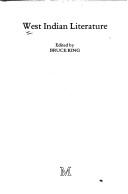
ISBN: 0333235908 0333235916 Year: 1979 Publisher: New York, NY : MacMillan,
Abstract | Keywords | Export | Availability | Bookmark
 Loading...
Loading...Choose an application
- Reference Manager
- EndNote
- RefWorks (Direct export to RefWorks)
Book
ISBN: 1535878290 081037594X 9781535878296 Year: 1992 Publisher: [Place of publication not identified] Cengage Gale
Abstract | Keywords | Export | Availability | Bookmark
 Loading...
Loading...Choose an application
- Reference Manager
- EndNote
- RefWorks (Direct export to RefWorks)
Annotation st:The series is cited in BCL3 and Sheehy. Thirty-one writers are profiled in this volume, each writer described in an extensive essay illustrated with photos and dust jacket or manuscript page reproductions and accompanied by bibliographies and references. Includes a cumulative index for the series. Annotation copyrighted by Book News, Inc., Portland, OR.
Caribbean literature (English) --- West Indian literature (English) --- Authors, African. --- Bio-bibliography --- Dictionaries.
Book
ISBN: 9401211027 9789401211024 9789042038608 9042038608 1322116997 Year: 2014 Publisher: Amsterdam, Netherlands : Rodopi,
Abstract | Keywords | Export | Availability | Bookmark
 Loading...
Loading...Choose an application
- Reference Manager
- EndNote
- RefWorks (Direct export to RefWorks)
The present book offers a reader-theoretical model for approaching anglophone Caribbean women’s writing through affects, emotions, and feelings related to sexuality, a prominent theme in the literary tradition. How does an affective framework help us read this tradition of writing that is so preoccupied with sexual feelings? The novelists discussed in the book – chiefly Erna Brodber, Opal Palmer Adisa, Edwidge Danticat, Shani Mootoo, and Oonya Kempadoo – are representative of various anglophone Caribbean island cultures and English-speaking back¬grounds. The study makes astute use of the theoretical writings of such scholars as Sara Ahmed, Milton J. Bennett, Sue Campbell, Linden Lewis, Evelyn O’Callaghan, Lizabeth Paravisini – Gebert, Lynne Pearce, Elspeth Probyn, Eve Kosofsky Sedgwick, and Rei Terada, as well as the critical writings of Adisa, Brodber, Kempadoo, to shape an individual, focused argument. The works of the creative artists treated, and this volume, hold sexuality and emo¬tions to be vital for meaning-production and knowledge-negotiation across diffe¬rences (be they culturally, geographi¬cally or otherwise marked) that chal¬lenge the postcolonial reading process.
West Indian literature (English) --- Sex in literature. --- English literature --- West Indian literature --- History and criticism. --- Women authors. --- Caribbean literature (English) --- Women authors
Book
ISBN: 9780199765096 019976509X Year: 2016 Publisher: New York : Oxford University Press,
Abstract | Keywords | Export | Availability | Bookmark
 Loading...
Loading...Choose an application
- Reference Manager
- EndNote
- RefWorks (Direct export to RefWorks)
Why did the novel take such a long time to emerge in the colonial world? And, what cultural work did it come to perform in societies where subjects were not free and modes of social organization diverged from the European cultural centers where the novel gained its form and audience? Answering these questions and more, Volume 11, The Novel in Africa and the Caribbean since 1950 explores the institutions of cultural production that exerted influence in late colonialism, from missionary schools and metropolitan publishers to universities and small presses. How these structures provoke and respond to the literary trends and social peculiarities of Africa and the Caribbean impacts not only the writing and reading of novels in those regions, but also has a transformative effect on the novel as a global phenomenon.Together, the volume's 32 contributing experts tell a story about the close relationship between the novel and the project of decolonization, and explore the multiple ways in which novels enable readers to imagine communities beyond their own and thus made this form of literature a compelling catalyst for cultural transformation. The authors show that, even as the novel grows in Africa and the Caribbean as a mark of the elites' mastery of European form, it becomes the essential instrument for critiquing colonialism and for articulating the new horizons of cultural nationalism. Within this historical context, the volume examines works by authors such as Chinua Achebe, Nadine Gordimer, George Lamming, Jamaica Kincaid, V.S. Naipaul, Zoe Wicomb, J. M. Coetzee, and many others.
African fiction (English) --- Caribbean fiction (English) --- West Indian fiction (English) --- English fiction --- History and criticism. --- Africa --- Caribbean Area --- West Indies --- In literature. --- History and criticism --- West Indian authors --- English literature --- West Indian literature (English) --- Caribbean literature (English)
Book
ISBN: 0801425751 9781501722936 150172293X 9780801425752 1501722948 Year: 2018 Publisher: Cornell University Press
Abstract | Keywords | Export | Availability | Bookmark
 Loading...
Loading...Choose an application
- Reference Manager
- EndNote
- RefWorks (Direct export to RefWorks)
In Simon Gikandi's view, Caribbean literature and postcolonial literature more generally negotiate an uneasy relationship with the concepts of modernism and modernity-a relationship in which the Caribbean writer, unable to escape a history encoded by Europe, accepts the challenge of rewriting it. Drawing on contemporary deconstructionist theory, Gikandi looks at how such Caribbean writers as George Lamming, Samuel Selvon, Alejo Carpentier, C. L. R. James, Paule Marshall, Merle Hodge, Zee Edgell, and Michelle Cliff have attempted to confront European modernism.
Caribbean fiction (English) --- West Indian fiction (English) --- Modernism (Literature) --- History and criticism. --- Carpentier, Alejo, --- Crepuscolarismo --- Literary movements --- Postmodernism (Literature) --- English fiction --- Caribbean literature (English) --- West Indian literature (English) --- West Indian authors --- Literary studies: c 1900 to c 2000
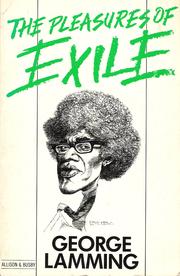
ISBN: 0850315816 0850315824 Year: 1984 Publisher: Allison and Busby
Abstract | Keywords | Export | Availability | Bookmark
 Loading...
Loading...Choose an application
- Reference Manager
- EndNote
- RefWorks (Direct export to RefWorks)
Colonies in literature. --- Exiles in literature. --- Novelists, Barbadian --- West Indian literature (English) --- West Indians --- Biography --- History and criticism. --- Intellectual life --- Colonies in literature --- Exiles in literature --- Ethnology --- Barbadian novelists --- History and criticism --- Lamming, George,
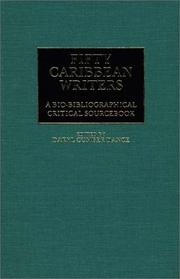
ISBN: 0313239398 Year: 1986 Publisher: Westport (Conn.): Greenwood
Abstract | Keywords | Export | Availability | Bookmark
 Loading...
Loading...Choose an application
- Reference Manager
- EndNote
- RefWorks (Direct export to RefWorks)
820 <100> <03> --- Authors, Caribbean --- -Caribbean literature (English) --- -West Indian literature (English) --- -English literature --- West Indian literature --- English literature --- Caribbean literature --- Caribbean authors --- Engelse literatuur: Commonwealth--Naslagwerken. Referentiewerken --- Biography --- -Dictionaries --- Bio-bibliography --- Dictionaries --- Caribbean Area --- -West Indies --- Antilles --- Caribbean Islands --- Islands of the Caribbean --- Islands of the Atlantic --- Caribbean Free Trade Association countries --- Caribbean Region --- Caribbean Sea Region --- West Indies Region --- In literature --- -Bibliography --- -Dictionaries. --- -Engelse literatuur: Commonwealth--Naslagwerken. Referentiewerken --- 820 <100> <03> Engelse literatuur: Commonwealth--Naslagwerken. Referentiewerken --- Caribbean literature (English) --- West Indian literature (English) --- Biography&delete& --- Bio-bibliography&delete& --- West Indies --- Bibliography --- Dictionaries. --- LITTERATURE ANTILLAISE DE LANGUE ANGLAISE --- ECRIVAINS ANTILLAIS --- REGION CARAÏBE --- BIO-BIBLIOGRAPHIES --- DICTIONNAIRES --- BIOGRAPHIES --- DANS LA LITTERATURE
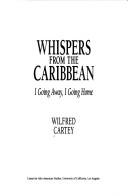
ISBN: 0934934355 0934934363 9780934934367 Year: 1991 Volume: 11 Publisher: Los Angeles : Center for Afro-American Studies, University of California,
Abstract | Keywords | Export | Availability | Bookmark
 Loading...
Loading...Choose an application
- Reference Manager
- EndNote
- RefWorks (Direct export to RefWorks)
English literature --- Caribbean Area --- Caribbean fiction (English) --- Roman antillais (anglais) --- History and criticism --- Histoire et critique --- West Indian fiction (English) --- History and criticism. --- English fiction --- West Indian literature (English) --- Caribbean literature (English) --- West Indian authors --- West Indies --- In literature. --- Caribbean area --- Caribbean fiction (English) - History and criticism. --- West Indian fiction (English) - History and criticism. --- Region caraïbe --- Litterature anglaise --- Ethnographie --- Auteurs caraibes
Book
ISBN: 0435986651 Year: 1983 Publisher: London : Heinemann,
Abstract | Keywords | Export | Availability | Bookmark
 Loading...
Loading...Choose an application
- Reference Manager
- EndNote
- RefWorks (Direct export to RefWorks)
West Indian fiction (English) --- -Literature and society --- -Literature --- Literature and sociology --- Society and literature --- Sociology and literature --- Sociolinguistics --- English fiction --- West Indian literature (English) --- History and criticism --- Social aspects --- West Indian authors --- Literature and society --- History and criticism. --- -History and criticism --- Literature --- Littérature antillaise de langue anglaise --- ROMAN ANTILLAIS DE LANGUE ANGLAISE --- LITTERATURE ET SOCIETE --- Histoire et critique --- HISTOIRE ET CRITIQUE --- CARAIBES
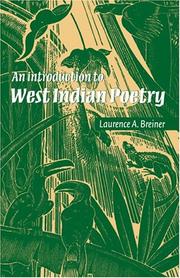
ISBN: 0521587123 0521583314 0511007418 0511612036 9780511007415 9780521587129 9780521583312 9780511612039 Year: 1998 Publisher: Cambridge : Cambridge University Press,
Abstract | Keywords | Export | Availability | Bookmark
 Loading...
Loading...Choose an application
- Reference Manager
- EndNote
- RefWorks (Direct export to RefWorks)
This introduction to West Indian poetry is written for readers making their first approach to poetry in English written in the Caribbean. It offers a comprehensive literary history from the 1920s to the 1980s, with particular attention to the relationship of West Indian poetry to European, African and American literature. Close readings of individual poems give detailed analysis of social and cultural issues at work in the writing. Laurence Breiner's exposition speaks powerfully about the defining forces in Caribbean culture from colonialism to resistance and decolonization.
Poetry --- American literature --- anno 1900-1999 --- Arts and Humanities --- Language & Linguistics --- West Indian poetry (English) --- History and criticism. --- West Indies --- Intellectual life. --- In literature. --- English poetry --- West Indian literature (English) --- West Indian authors --- Antilles --- Caribbean Islands --- Islands of the Caribbean --- Islands of the Atlantic --- POESIE ANTILLAISE DE LANGUE ANGLAISE --- REGION CARAÏBE --- HISTOIRE ET CRITIQUE --- DANS LA LITTERATURE --- VIE INTELLECTUELLE
| Listing 1 - 10 of 16 | << page >> |
Sort by
|

 Search
Search Feedback
Feedback About UniCat
About UniCat  Help
Help News
News